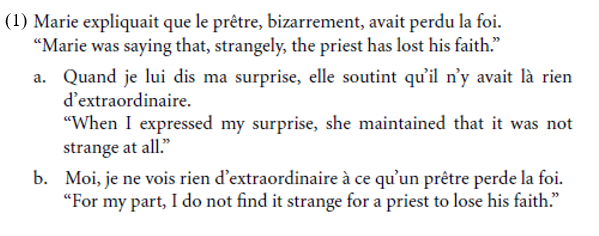

Grammar


Tenses


Present

Present Simple

Present Continuous

Present Perfect

Present Perfect Continuous


Past

Past Simple

Past Continuous

Past Perfect

Past Perfect Continuous


Future

Future Simple

Future Continuous

Future Perfect

Future Perfect Continuous


Parts Of Speech


Nouns

Countable and uncountable nouns

Verbal nouns

Singular and Plural nouns

Proper nouns

Nouns gender

Nouns definition

Concrete nouns

Abstract nouns

Common nouns

Collective nouns

Definition Of Nouns


Verbs

Stative and dynamic verbs

Finite and nonfinite verbs

To be verbs

Transitive and intransitive verbs

Auxiliary verbs

Modal verbs

Regular and irregular verbs

Action verbs


Adverbs

Relative adverbs

Interrogative adverbs

Adverbs of time

Adverbs of place

Adverbs of reason

Adverbs of quantity

Adverbs of manner

Adverbs of frequency

Adverbs of affirmation


Adjectives

Quantitative adjective

Proper adjective

Possessive adjective

Numeral adjective

Interrogative adjective

Distributive adjective

Descriptive adjective

Demonstrative adjective


Pronouns

Subject pronoun

Relative pronoun

Reflexive pronoun

Reciprocal pronoun

Possessive pronoun

Personal pronoun

Interrogative pronoun

Indefinite pronoun

Emphatic pronoun

Distributive pronoun

Demonstrative pronoun


Pre Position


Preposition by function

Time preposition

Reason preposition

Possession preposition

Place preposition

Phrases preposition

Origin preposition

Measure preposition

Direction preposition

Contrast preposition

Agent preposition


Preposition by construction

Simple preposition

Phrase preposition

Double preposition

Compound preposition


Conjunctions

Subordinating conjunction

Correlative conjunction

Coordinating conjunction

Conjunctive adverbs


Interjections

Express calling interjection


Grammar Rules

Passive and Active

Preference

Requests and offers

wishes

Be used to

Some and any

Could have done

Describing people

Giving advices

Possession

Comparative and superlative

Giving Reason

Making Suggestions

Apologizing

Forming questions

Since and for

Directions

Obligation

Adverbials

invitation

Articles

Imaginary condition

Zero conditional

First conditional

Second conditional

Third conditional

Reported speech


Linguistics

Phonetics

Phonology

Linguistics fields

Syntax

Morphology

Semantics

pragmatics

History

Writing

Grammar

Phonetics and Phonology

Semiotics


Reading Comprehension

Elementary

Intermediate

Advanced


Teaching Methods

Teaching Strategies

Assessment
On embedded evaluatives
المؤلف:
OLIVIER BONAMI AND DANIELE GODARD
المصدر:
Adjectives and Adverbs: Syntax, Semantics, and Discourse
الجزء والصفحة:
P291-C9
2025-04-29
718
On embedded evaluatives
Up to now we have assumed that the speaker was responsible for the judgment associated with the evaluative adverb. This is a simplification: although it is by far the most frequent situation, it is not always the case. Whether or not an agent other than the speaker can take charge of conventional implicatures has been the object of some debate. Whatever is the case for the (other) conventional implicatures, the data for evaluatives is clear. There are contexts where the speaker attributes the judgment to another agent; the clearest case is that of speech reports.
Consider sentence (1). Both (1a) and (1b) are possible continuations. Yet the agent responsible for the evaluative is the speaker in (1a), and Marie in (1b).

Potts (2005: 116–117) dismisses such examples as hidden cases of direct quotation. While this might be the correct analysis in some cases, this cannot be true for sentences like (2). Note that the evaluative phrase contains the indexical moi ‘me,’ which unambiguously refers to the speaker, and not Marie. Thus the evaluative phrase cannot be part of a direct quotation of Marie’s speech.

Thus, like most researchers (Bach 1999; Geuder 2000; Jayez and Rossari 2004) but contra Potts (2005), we accept that the agent responsible for the evaluative may be different from the speaker. Accordingly, an adequate analysis must not presuppose that evaluatives are strictly speaker-oriented. Although we do not provide an explicit account of examples like (2) here for lack of space, we note that an appropriate analysis can be provided by assuming that speech report verbs give rise to the same type of semantic representations as full utterances, including a representation of the dialogue gameboard of the agent whose speech is reported, where the evaluative can be scoped appropriately. Bonami and Godard (2007b) makes such an analysis explicit within an HPSG grammar.
 الاكثر قراءة في Linguistics fields
الاكثر قراءة في Linguistics fields
 اخر الاخبار
اخر الاخبار
اخبار العتبة العباسية المقدسة

الآخبار الصحية















 "المهمة".. إصدار قصصي يوثّق القصص الفائزة في مسابقة فتوى الدفاع المقدسة للقصة القصيرة
"المهمة".. إصدار قصصي يوثّق القصص الفائزة في مسابقة فتوى الدفاع المقدسة للقصة القصيرة (نوافذ).. إصدار أدبي يوثق القصص الفائزة في مسابقة الإمام العسكري (عليه السلام)
(نوافذ).. إصدار أدبي يوثق القصص الفائزة في مسابقة الإمام العسكري (عليه السلام) قسم الشؤون الفكرية يصدر مجموعة قصصية بعنوان (قلوب بلا مأوى)
قسم الشؤون الفكرية يصدر مجموعة قصصية بعنوان (قلوب بلا مأوى)


















